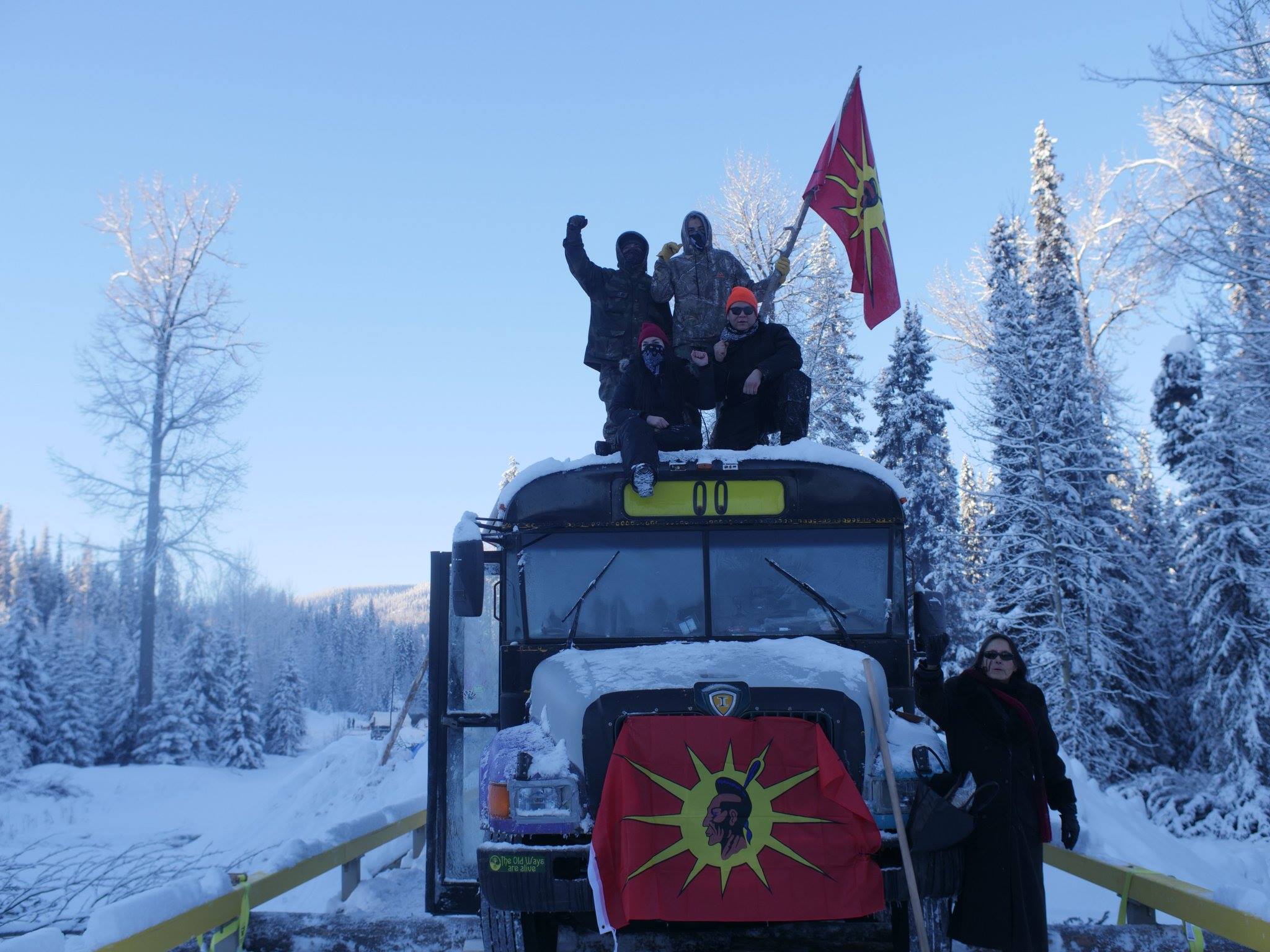
Reconciliation Is Dead: A Strategic Proposal
Editor’s note: this piece began circulating in the wake of the raids on Wet’suwet’en territory. We have covered these topics and discussed strategic approaches to escalation in recent weeks. This piece contributes to this ongoing discussion. Featured image via Unist’ot’en Camp. #ShutDownCanada #ReconciliationIsDead #RevolutionIsAlive. As with all cross-posts, sharing this does not imply that Aphonika Distro endorses Deep Green Resistance.
By tawinikay (aka Southern Wind Woman)
If only one thing has brought me joy in the last few weeks, it began when the matriarchs at Unist’ot’en burned the Canadian flag and declared reconciliation dead. Like wildfire, it swept through the hearts of youth across the territories. Out of their mouths, with teeth bared, they echoed back: reconciliation is dead! reconciliation is dead! Their eyes are more keen to the truth so many of our older generation have been too timid to name. The Trudeau era of reconciliation has been a farce from the beginning. It has been more for settler Canadians than natives all along.
“Reconciliation is dead” is a battle cry.
It means the pressure to live up to our side of the bargain is over. The younger generation have dropped the shackles to the ground. Perhaps we are moving into a new time, one where militancy takes the place of negotiation and legal challenge. A time where we start caring less about what the colonizer’s legal and moral judgement and more about our responsibilities.
Criticizing reconciliation is not about shaming those elders and people who participated in the Truth and Reconciliation Commission, it’s about attacking a government that used that moment of vulnerability to bolster it’s global image. I have said it before and I’ll say it again, I do not blame our older generation for being hopeful about a more peaceful future. Those who lived through the horror of residential schools and the 60s scoop and the road allowance days and the sled dog slaughters could only have wanted a better life for the coming generations. It is the responsibility of those younger generations to stand up and say that what is being offered is not good enough. It is up to us to say that we would rather another hundred years of struggle than to accept the gentle assimilation being offered. It is up to us to give thanks to our elders for their service and then to turn to the frontlines with our feathers and drums and fists.
Because ideas on their own don’t make change. That is a liberal lie. It takes action behind words to make a difference. That action needs to be undertaken together. Neither ideas or practice are created by individuals. Everything written here is the result of discussion and interaction with other land defenders, lovers, anarchists, mothers, children, and resistors. We need to be accountable to the things we say while also recognizing that knowledge is created by communities. It has to always be seen that way in order to subvert hierarchy, to never allow one person to be elevated over any other.
So what is written here is all of yours. Take it and do with it as you please.
Argue it. Defend it. Decry it. Make it your own.
Forget the rules.
Canada is a colonial state. It exists to govern territory and manage the resources of that territory. It is nothing less and nothing more. It has done an excellent job convincing its citizens that it stands for something, something good. This is the way it maintains its legitimacy. The national myth of politeness and civility wins the support of its constituents. This has been carefully constructed over time and it can be deconstructed. In fact, the rules of Canada change all the time. I would write more about this but the truth is I could not do a better job than something I recently came across online. @Pow_pow_pow_power recently wrote the following:
Settler governments have been making up the rules as they go from the beginning of their invasions. While each generation of us struggles to educate ourselves to the rulebook, they disregard it and do what they want when they want. This should not be a surprise. It has always been this way because they prioritize themselves about all – above other people, above animal relatives, above the balance of Nature, and certainly above “what is right”. Laws have always been passed to legitimize their whims and interests as the intentions of seemingly rational rulers, and to keep us in compliance with their needs.
We currently live in a time where our Imperialist structures have been deeply concerned with appearing ordered and civilized to fellow regimes of power to cultivate a sense of superiority. This is why the violence we have become accustomed to is no longer mass slaughters and public torture and exiles but night raids and disappearances, criminalizations and being locked into systems of neglect. It has become more reliant on structural violence & erasure than direct violence, and therefore more insidious. Insidiousness is more tidily effective and harder to pinpoint as a source of injustice.
This is why when we approach them, lawful and peaceful and rational and fair minded and smooth toned, as gracious and calm as can be, we are easily dismissed with polite white smiles of “best intentions” “deepest regrets” and “we’re doing our best”, in fact “we’re doing better than most”. And when we insist, more firmly, more impassioned, more justified, the response from Settler Governments is as clear as we see now: “Why can’t you people just obey?”
Canadians want to believe that colonial violence is a thing of the past, so the government hides it for them. That is why the RCMP doesn’t allow journalists to film them as they sick dogs on women defending their land. That is why they will get away with it.
The time has come to stop looking for justice in settler law.
For Indigenous people in Canada, it is impossible to avoid the violence inflicted on us by the state. When we raise our fist and strike back, it is always an act of self-defense. Always. Committing to non-violence or pacifism in the face of a violent enemy is a dangerous thing to do. Yet, attempting to avoid using violence until absolutely necessary is a noble principle. One which carries the most hope for a new future. But what does violence mean to the settler state?
They don’t consider it violent to storm into a territory with guns drawn and remove its rightful occupants. They don’t consider it violent to level mountaintops, or clearcut forests, or to suck oil out of the ground only to burn it into the air. They don’t consider it violent to keep chickens and pigs and cows in tiny crates, never allowing them to see sunlight, using them like food machines.
But smash a window of a government office..
Well, that goes too far.
It is time we see their laws for what they are: imaginary and hypocritical. Settler laws exist to protect settlers. We are not settlers. We are Michif. We are Anishinaabek. We are Onkwehón:we. We are Nêhiyawak. We are Omàmiwininì. We are Inuit. We are Wet’suwet’en. So why are we still appealing to their laws for our legitimacy?
Time after time, communities spend hundreds of thousands of dollars on legal challenges to land rights. Chippewa of the Thames First Nation used money won in a land claim to launch a legal challenge against Canada to say they were never properly consulted, nor did they consent to, the Line 9 pipeline through their territory. The Supreme Court ruled against them, saying that Indigenous peoples do not have the right to say no to industrial projects in their territories. Line 9 is still operational. The Wet’suwet’en won probably the most significant legal challenge in Canadian history. The Delgamuukw verdict saw the courts acknowledge that the We’suwet’en territory is unceded, that they hold title and legal jurisdiction, and yet look at how Canada honours that. Legal victories are not the way we win our land and dignity. Canada cares as little about Canadian law as they do Indigenous law.
The same goes for the United Nations and their precious UNDRIP. We have seen that the state will adopt United Nations Declaration on Indigenous Peoples (UNDRIP) principles and interpret them to suit their needs. That document says that governments and companies need free, prior, and informed consent to engage in projects in their territories. BC adopted it and, yet, says that it does not mean they have to gain consent from the Wet’suwet’en. Consent will never actually mean the right to say no. And the UN has no way to enforce it.
The time has passed for legal challenge in their courts that does nothing but drain our resources and slow us down. I honour those relatives and ancestors who attempted the peaceful resolution, who trusted in the good intentions of other humans. But the settlers have proven that the peaceful options they offered us are lies. Fool us once, shame on you.
This is not only about Unist’ot’en anymore.
This is about all of us. Any day now the RCMP could attempt to move in and evict the rail blockade at Tyendinaga. I stand in solidarity with them as much as I do with the Wet’suwet’en. This moment is not just about getting the government and their militarized goons to back down at Unist’ot’en and Gitdum’ten, it’s about getting them to loosen their grip around all of our necks. This moment is about proclaiming reconciliation dead and taking back our power.
This is not to say that we should forget about Unist’ot’en and abandon them when they need us most. It is a proposal to widen our scope so that we don’t lose our forward momentum if what happens out west doesn’t meet our wildest dreams. This is about crafting a stronger narrative.
This means that we should think before claiming that the Wet’suwet’en have the right to their land because it is unceded. Do we not all have a right to the land stolen from our ancestors? For land to be unceded it means that it has never been sold, surrendered, or lost through conquest. The Royal Proclamation of 1763 urged Canada and the dominion to only take land through the making of treaty. And so agents of Canada set out to do so. They continued to make treaties across the continent, sometimes lying about the content of the treaties to ancestors who didn’t speak english, sometimes finding whoever the hell would sign the treaty without much concern for if that person was acting with the support of the community. After the signing of the last treaty, Canada made it illegal for Indians to hire lawyers to challenge land claims. And then they stole the rest of what they wanted. They continued to flood the land with settlers until native peoples had only 0.2% of the land they once protected and lived on.
I don’t care about appealing to the legitimacy of unceded territory. All land is stolen land. Canada has no jurisdiction on any of it because they have broken any agreements they ever made in the process of taking it.
The same critique rings true for holding up hereditary governance as the only true leadership of Indigenous peoples. I am not advocating for band council. But it is important to understand that many of our relations have lost the hereditary systems that once helped them live good lives. We are going to have to rekindle our governance. Some we can pull from the past, some we will have to make anew. All freely chosen forms of Indigenous governance are legitimate. Our legitimacy does not flow from the mouths of our leaders, but from our connection to the land and water and our commitment to our responsibilities to all life today and generations to come.
This is a good thing if we let it be. It is foolish to think we would not have changed and grown in 300 years. Our systems would look different today no matter what. This is an opportunity to combine new and beautiful ideas with the time-honoured traditions and ceremonies of our ancestors, spiritual communities where hierarchy is subverted and gender is liberated!
It is time to shut everything the fuck down.
Canada has always been afraid of us standing in our power. Reconciliation was a distraction, a way for them to dangle a carrot infront of us and trick us into behaving. Now is the time to show them how clear our vision is. Being determined and sure is not the same as being unafraid. There are many dangerous days ahead of us. It is dangerous to say, “I will not obey.”
The first thing we need to do is stop stabbing each other in the back. Take a seat on band council if you want, but stop letting it go to your head. Don’t ever see yourself as more than a servant, a cash distributor, a rule enforcer. Being elected is not the same as earning a place of respect in your community. It does not make you an elder. Let me take this time to say a giant “fuck you” to the Métis nations who sign pipeline agreements because they are so excited the government considered them Indigenous. The Métis have no land rights in Ontario and yet they continue to sign agreements as if they do, throwing the Indigenous nations with actual territory under the train. Let me extend that “fuck you” to the Indigenous nations who signed pipeline agreements and stand by in silence as their relations are attacked for protecting the water. Or even worse when they do interviews with pro-oil lobby groups and conservative media decrying the land defenders in their midst. Can’t they see the way Canadians eat up their words, drooling over the division amongst us, using it to devalue our way of life? I do not condone attacking our relatives who have lost the red path, but we need to find a way to bring them back home. Not everybody has to take up a frontline in their community, but at the bare minimum they should refuse to cooperate with the colonial government and their corporate minions.
The second thing we need to do is act. But we do not have to limit ourselves to actions that demand the withdrawal of forces from Wet’suwet’en territory. The federal government is the one calling the shots, not just at Unist’ot’en but at every point of native oppression across all the territories. Any attack on the state of Canada is in solidarity. Any assertion of native sovereignty is in solidarity.
It’s time to start that occupation you’ve been dreaming up.
Is there a piece of land that has been annexed from your territory? Take it back. Is there a new pipeline being slated through your backyard? Blockade the path. Are their cottagers desecrating the lake near your community? Serve them an eviction notice and set up camp. Sabotage the fish farms killing the salmon. Tear down the dam interrupting the river. Play with fire.
When we put all of our hopes and dreams into one struggle in one spot, we set ourselves up for heartbreak and burnout. Let’s fight for the Wet’suwet’en people, yes! But let’s honour their courage and their actions by letting them inspire us to do the same. Let’s fight for them by fighting for the manoomin and the wetlands and the grizzlies.
Choose your accomplices wisely. Liberals who read land acknowledgments often have too much invested in this system to actually see it change. Communists envision a system without a capitalist Canada, but they still want a communist state. One that will inevitably need to control land and exploit it. Find common heart with those who want to see the state destroyed, to have autonomous communities take its place, and to restore balance between humans and all our relations. Choose those who listen more than they talk, but not those who will do whatever you say and not think for themselves. They are motivated by guilt. Find those who have a fire burning in them for a more wild and just world. Most of them will be anarchists, but not all, and not all anarchists will come with a good mind.
Creating a battlefield with multiple fronts will divide their energies. The rail blockades are working! If the night time rail sabotage and the copper wire and the blockades keep coming, it will shut down all rail traffic across this awful economy. More is better. But do it not just for the Wet’suwet’en, do it for the rivers and streams that weave themselves under the rails. Do it for the ancestors who saw the encroaching railroad as their coming demise.
And as a critique out of Montreal wrote: don’t settle for symbolic and intentional arrest.
When they come to enforce an injunction, move to another part of the rail.
When they come with a second injunction, block the biggest highway nearby.
When they come with a third injunction, move to the nearest port.
Stay free and fierce. The folks at Unist’ot’en and Gitdum’ten didn’t have the option to, but you do. Anticipate their next move and stay ahead of them.
This is a moment among many moments. Our ancestors have been clever, sometimes biding their time quietly, sometimes striking, always secretly passing on our ceremonies and stories. I honour them as I honour you now. We are still here because of them and our children and our children’s children will still be here because of us. Never forget who we are. Fight in ceremony.
I suppose this is a proposal for adopting a strategy of indigenous anarchism here on Turtle Island. A rejection of tactics that demand things from powerful people and a return to building for ourselves a multitude of local, diverse solutions. This is a rejection of Idle No More style organizing, let’s not repeat the mistakes of the past (for a detailed critique of INM, see https://warriorpublications.wordpress.com/2012/12/12/idle-no-more-speak-for-yourself/ and while you’re there read everything else). It is a plea for us to choose our own leaders and create governance that refuses hierarchy. An ask for us to reject reconciliation and move towards a militant reclamation. The idea of indigenous anarchism is still in its infancy. Write me about it.
This is one of our moments. Let’s make it not about demanding for them to leave Unist’ot’en alone, but about demanding that they leave the land alone. Don’t make it about stopping CGL from making money, make it about denouncing the idea of money. This is about colonization everywhere. This is about all of us.
To the settlers inevitably reading this zine.
What is written here is meant for you too. Not in the “rise up and take back your land” kind of way. Been there, done that.
But I have been reading the messaging on the reportbacks and in the media and I see you falling into all sorts of tired traps. You are not just cogs in the solidarity machine, you too can take up struggles in the cities you live. Remember the Two Row: you can fight parallel battles towards the same goals.
I have heard many an elder say that we will not win this fight on our own, and that is most certainly true. Thank you for the ways you have attacked the economy and the state. Thank you for answering the call. Now take this and run with it.
You too should look for ways to defend the land and water in the places you live. You too should look for ways to undermine and weaken the power of the government over these lands. Don’t let yourself be disheartened if the RCMP don’t leave Unist’ot’en. That is only one fight of many. That is only the beginning. Don’t fall into the traps of appealing to Canadian or international law.
See yourself for what you are, for who your community is. Act in ways that bring about a world where reconciliation is possible, a world in which your people give back land and dismantle the centralized state of Canada. Don’t romanticize the native peoples you work with. Don’t feel that you can’t ever question their judgment or choose to work with some over others. Find those that have kept the fire alive in their hearts, those who would rather keep fighting than accept the reconciliation carrot. Don’t ever act from guilt and shame.
And don’t let yourself believe that you can transcend your settlerism by doing solidarity work. Understand that you can, and should, find your own ways to connect to this land. From your own tradition, inherited or created.
Print this zine and distribute it to your Indigenous comrades.
Take risk. Dream big. Pursue anarchy. Stay humble.
This zine was published by Aphikona Distro. Contact them at aphikonadistro@riseup.net.
If this speaks to you, we recommend you study Decisive Ecological Warfare.

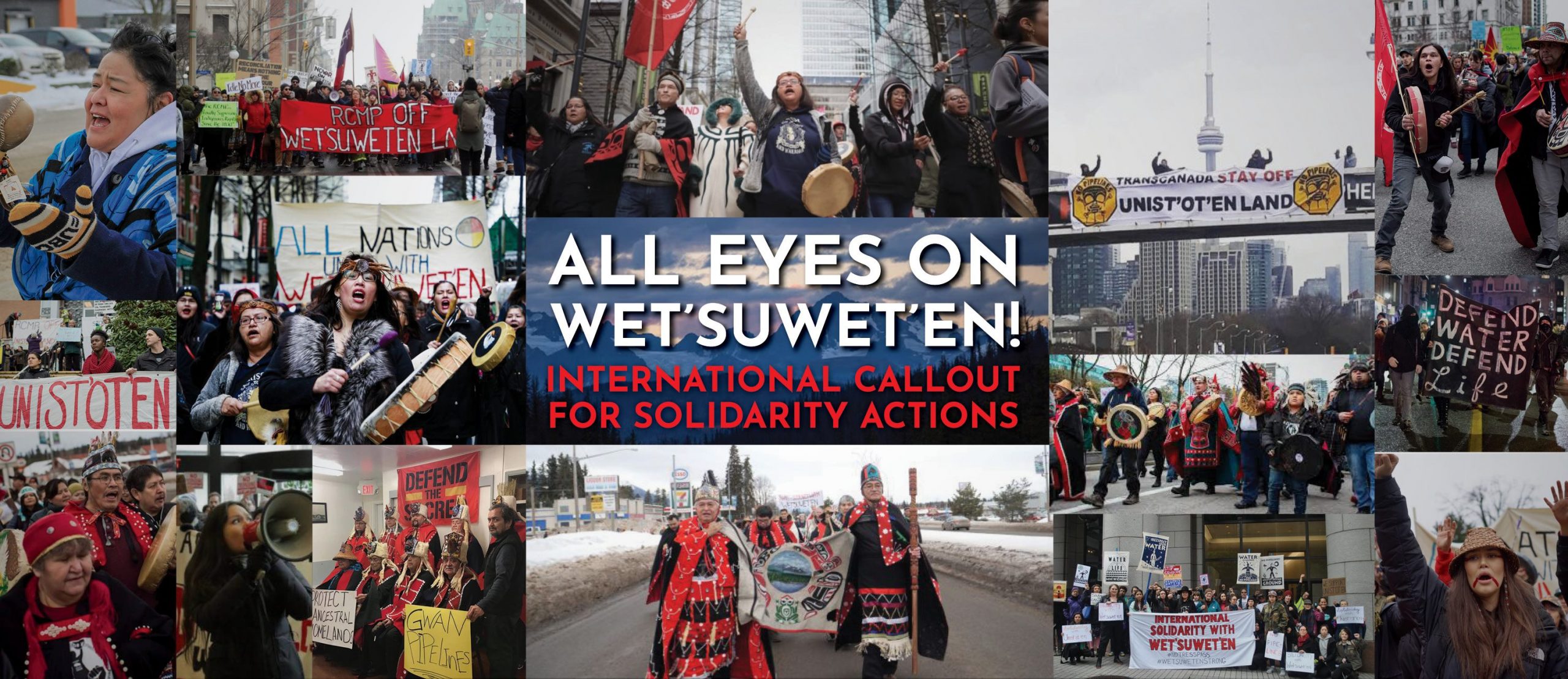
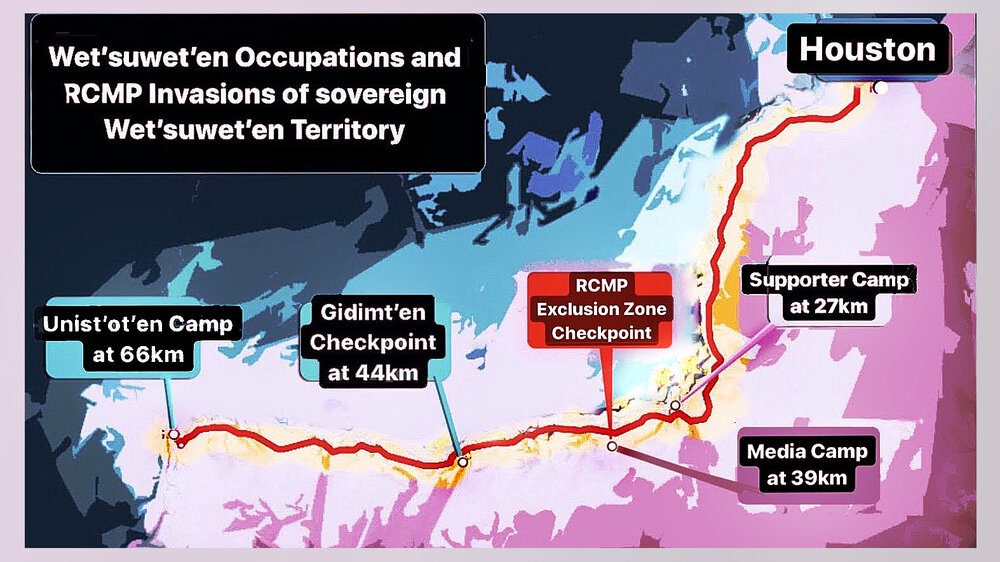
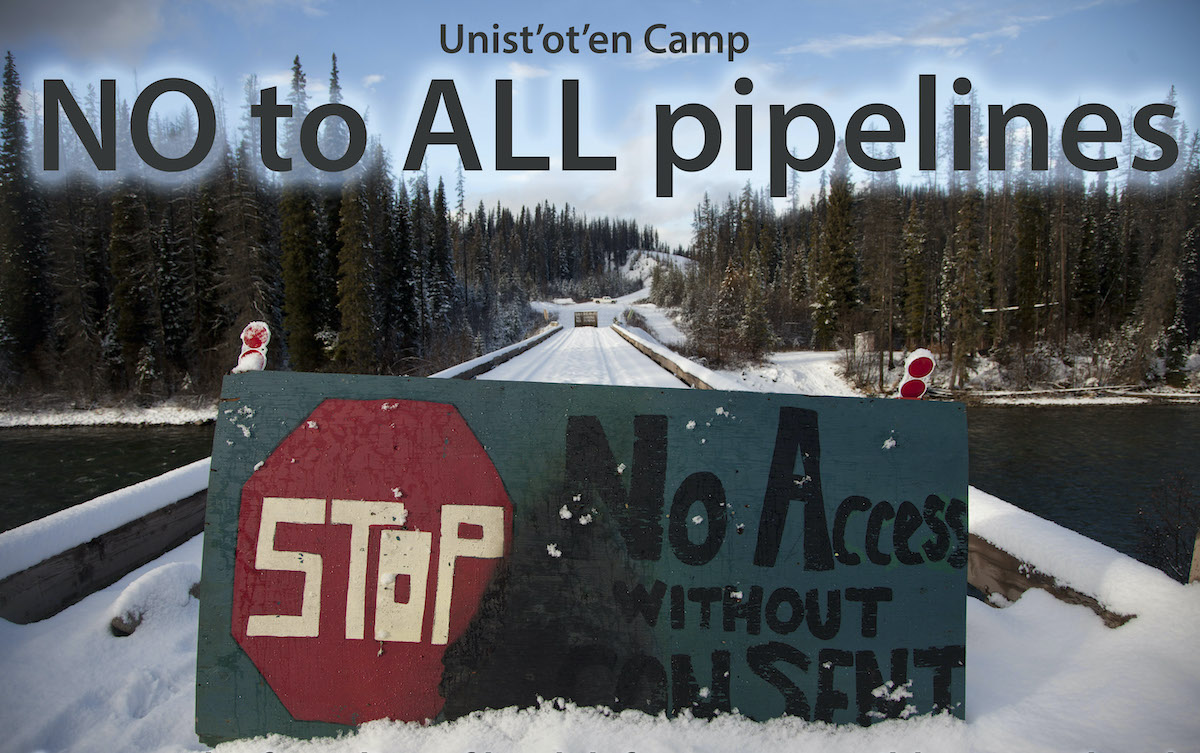
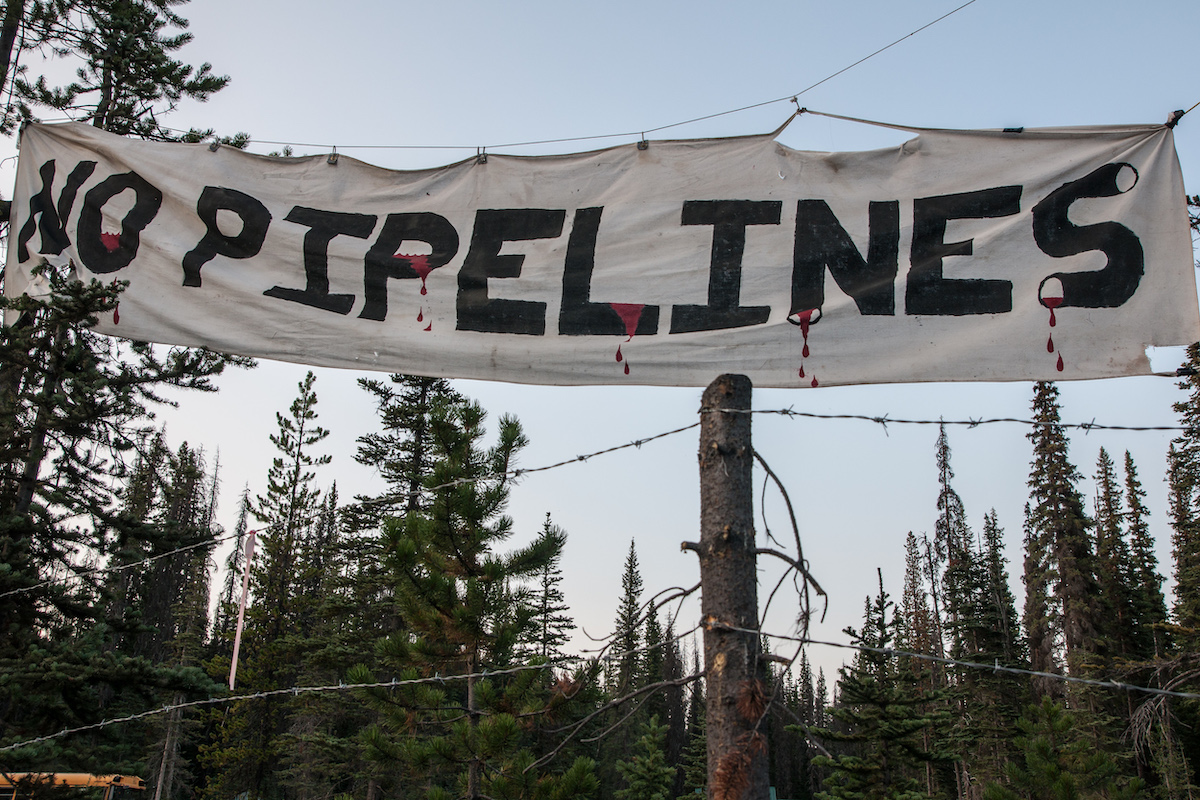

 DONATE to
DONATE to 
